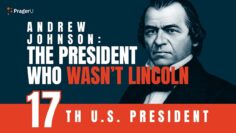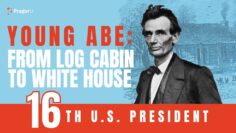
Andrew Jackson: The People’s President
Both revered and reviled in his own time, the seventh President of the United States Andrew Jackson never backed down from a fight. His “my way or the highway” approach made “Old Hickory” as ruthless with his veto pen as with his dueling pistol. Allen Guelzo, Distinguished Research Scholar in the James Madison Program at Princeton University, tells Jackson’s story.
Watch PragerU’s American Presidents series: https://l.prageru.com/3IjUsLU
SUBSCRIBE 👉 https://www.prageru.com/join
Script:
No American President has been more beloved and reviled than Andrew Jackson, the seventh President of the United States. This was as true during his own day as it is in ours.
Andrew Jackson was born in South Carolina on March 15, 1767. He was barely ten years old when the American Revolution broke out. The war claimed the lives of his two brothers and his mother, leaving Jackson orphaned, alone, and with a bitter hatred for all things British.
In time, he would get his revenge.
Tall with sharp features topped by a thatch of red hair, Jackson always made an impression. In 1788, after a brief study of the law, he wangled an appointment as a district attorney in Tennessee, then known as the Southwest Territories, began investing in land and slaves, and earned an appointment as major general of the Tennessee militia. Though he had no formal military training, he was a natural leader. The men under his command would follow him anywhere. And if they didn’t, he might hang them. He fought numerous duels. He killed a man, Charles Dickinson, in one. That was Jackson.
As Jackson’s investments and military reputation advanced, so did his political interests. He served in Congress when Tennessee became a state in 1796 and later briefly as senator. His politics were decidedly Jeffersonian. He believed that owning land was the only real wealth; that industry, commerce, and banking were financial traps that ultimately benefited the rich at the expense of everyone else.
In 1812, a new war broke out between the United States and Great Britain. The conflict was a disaster in almost every respect for the ill-prepared Americans. But it ended on a high note thanks to Jackson. Sporting the nickname “Old Hickory” (hickory being a notoriously hard wood) and commanding a hastily assembled army at New Orleans, Jackson won a terrific victory over a British invasion force in 1815. That victory made Jackson the most celebrated man in America.
By 1824, Jackson was ready for a run at the presidency. His two most serious opponents were the Speaker of the House, Henry Clay, and the secretary of state, John Quincy Adams.
Jackson won the popular vote but did not secure a majority in the electoral college, which, according to the Constitution, threw the election into the House of Representatives. There, Clay’s sudden endorsement of Adams swung the chamber and the presidency to Adams.
An infuriated Jackson, convinced that Adams and Clay had colluded against him in a “corrupt bargain,” declared his intention to run again in 1828. This time he beat Adams in a landslide.
As president, he applied his characteristic ruthlessness to the federal budget, slashing infrastructure projects he did not believe were the province of the national government. When the national bank came up for recharter in 1832, he vetoed it.
Jackson, who harbored a lifelong distrust of bankers, insisted that the nation’s assets should be distributed to financial institutions throughout the United States rather than concentrated in one location. Was he right? No. This decision led to the financial depression of 1837. But Jackson never doubted himself. That was Jackson.
Old Hickory’s most controversial decision came in 1830. The issue was tariffs. South Carolina, represented by Jackson’s own vice president John Calhoun, insisted that tariffs be lowered because they favored manufacturing and commercial interests at the expense of Southern plantations. Calhoun assumed Jackson, a Southern planter himself, would agree. Otherwise, Calhoun warned, South Carolina would assert its state sovereignty and nullify the collection of federal tariffs within its boundaries.
But Jackson regarded South Carolina’s nullification threat as an attack on the Constitution — and on his authority as president. The states had voted themselves into a federal Union in 1788, Jackson insisted, and no single state or group of states could defy it.
For the full script, visit: https://www.prageru.com/video/andrew-jackson-the-peoples-president
source











*Straight, poor white mens’ president
Him Washington and Polk 🇺🇸
I am a libertarian Republican. I am ashamed that a YouTube channel which claims to be pro republican is prasing a racist Democrat president.
Jackson was an ignima. A horrible human being while at the same time an effective president and military leader. A true ignima.
He was right about the banks, although it took awhile to get worked out. Our current system of Federal Reserve banks is closer to Jackson’s thinking than the 2nd Bank of the United States was. He deserves his place on the $20 bill for his contribution to banking reform.
A "dreary Exodus"? He makes the genocide of Native Americans sound like a road trip in the rain. This is exactly the kind of whitewashed garbage you can expect from Prager "University".
I reckon he did good on all accounts, and as terrible as the coming war between the states would be and my Southern Sympathies, I can’t entirely blame Mr. Jackson for ensuring South Carolina backed down. That is the only point of contention I find in his presidency.
Otherwise, he paid off the debt, removed the federal bank, which was a great move in the long run. Seeing as The United States was financially stable for the rest of the 19th Century apart from a few mild bank failures.
These are far better than central banking’s erroneous return in the form of the Federal Reserve. Need I remind any that we were on the Gold standard and that federal income taxes were, aside from the War Between The States, non existent?
And the Indian Removal Act was a merciful, peaceful, and lawful act. Congress had approved, and Jackson had signed off on, the purchase of Indian land and the removal of the “civilized” tribes.
Even focusing purely on the morality of it was, and still would be, a good decision. The indians were called savages for more than being non European. They were war prone with each other and cruel even in peace times. Scalping prisoners and mutilating their enemies is not something anyone would want happening to them.
Considering all of this, as well as understandable White fears and anger, is it any wonder that Jackson would want to separate two groups in such a volatile state of affairs.
In the long run, the indians even kept self government on their reservations. As opposed to being utterly and totally destroyed by the night of The Old Republic.
All in all, there’s sound reasons that he’s my favorite President
He would
Be better than Biden in todays world
I'm done with this at bank part, Ending the central bank was his best accomplishments. To think otherwise makes you banking shill at the ready for your next bailout
Andrew Jackson helping us win our second war of independence against the English is the only thing I, as a history nut, will give him praise for. Everything else, he was one of the absolute worst presidents we had
How on earth did you turn andrew jackson "good"?!?!
He was responsible for the deaths of more than 6,000 native Americans!!!! He was a slave owner!!!
Missouri didnt susced.
jackson was a dictator defying the supreme court and acting like hitler did w the jews-a dark stain on american histrory-he did well at new orleans but the power it brought is the same as what infected nero and hitler-
It is not because of the closing of the bank that the panic of 1837 happened, but because he made it into law that federal land can only be bought by gold or silver.
Jackson was responsible for many thousands of Native American deaths June 1838 he moved 4 artillery groups that were fighting the native Seminoles in Florida to Cherokee co. NC to bombard the native Cherokees in this area Lt. John Phelps said that someday we would have to pay for treating these native people so terrible research vol. 21 Journal of Cherokee Studies
I like the way this gentleman avoids using the term, “Central Bank” by calling it the “National Bank”
And saying that it was a Bad Idea and that it caused a depression.
I’m sure there were other factors involved.
It looks like this man is a proponent of the Central Bank which means a proponent of our current Central Bank. Which is called the Federal Reserve.
So that must mean he is in with the “Globalists”.
Which also is allied to the “Deep State”
And that system of perpetual Debt has begun to enslave the entire world.
These are the same people who are responsible for assassinating President Kennedy and bringing down president Nixon.
And they are aiming to stop President Trump. There it is. I’ve just explained the M.O. of those who want to keep things the way they are and then move us into the Great Reset and into the new Central Bank Digital Currency or CBDC. Thus eventually and permanently enslaving mankind.
Bernie 2.0!
Andrew Jackson was a democrat slave owner who had one of his slaves whipped to death. And you want to turn him in to a "good" man. Not even GOD was able to do that. To HELL with Andrew Jackson.
He killed 6 million jews and started a world war because he failed art class, ✨ was Hitler ✨
like did someone break into the prageru headquarters and replace the pro jackson script with the truth
What happened to his father?